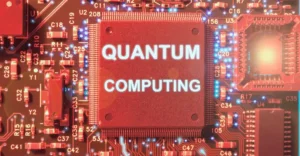
Quantum Computing Is A Rapidly Evolving Field With The Potential To Revolutionize Various Aspects Of Technology And Scientific Research. One Of The Fundamental Principles Underlying Quantum Computing Is Interference. In This Article, We Will Explore The Concept Of Interference In Quantum Computing And Delve Into Its Significant Benefits.
What Is Interference In Quantum Computing?
Interference Is A Phenomenon That Occurs When Two Or More Waves Interact With Each Other. In Quantum Computing, Interference Can Be Used To Control The Flow Of Information And To Amplify Certain Desired Outcomes.
How Does Interference Benefit Quantum Computing?
There Are Several Benefits To Using Interference In Quantum Computing. First, Interference Can Be Used To Amplify Certain States And Suppress Others. This Allows Quantum Computers To Perform Computations More Efficiently, As They Can Focus On The States That Are Most Likely To Lead To A Correct Solution. Second, Interference Can Be Used To Create Entanglement, Which Is A Phenomenon Where Two Or More Qubits Become Linked Together So That Their States Are Correlated. Entanglement Is A Powerful Tool For Quantum Computing, As It Allows Quantum Computers To Perform Tasks That Would Be Impossible With Classical Computers.
For Example, Interference Can Be Used To:
- Amplify Desired Outcomes: By Interfering Two Or More Waves, It Is Possible To Amplify The Desired Outcome And Suppress The Undesired Outcomes. This Can Be Used To Improve The Accuracy Of Quantum Algorithms.
- Control The Flow Of Information: Interference Can Be Used To Control The Flow Of Information In A Quantum Computer. This Can Be Used To Route Information To Specific Parts Of The Computer Or To Prevent Information From Leaking Out.
- Solve Computationally Challenging Problems: Interference Can Be Used To Solve Computationally Challenging Problems That Are Intractable For Classical Computers. For Example, Interference Can Be Used To Break Current Encryption Algorithms And To Simulate Complex Physical Systems.
What Is Quantum Interference?

Quantum Interference Is A Phenomenon In Quantum Mechanics Where Particles Or Waves Exhibit A Pattern Of Constructive And Destructive Interference. This Arises From The Wave-particle Duality Of Particles Such As Electrons And Photons, Which Can Behave As Both Particles And Waves.
How Does Quantum Interference Work?
When Particles Or Waves Are Passed Through A Barrier With Two Slits, They Create An Interference Pattern On A Screen Behind The Barrier. This Pattern Is Caused By The Waves Interfering With Each Other. In Some Places, The Waves Will Constructively Interfere, Creating A Bright Spot On The Screen. In Other Places, The Waves Will Destructively Interfere, Creating A Dark Spot On The Screen.
The Double-slit Experiment
The Double-slit Experiment Is An Iconic Experiment That Illustrates Quantum Interference. In This Experiment, Electrons Or Photons Are Passed Through A Barrier With Two Slits And Detected On A Screen Behind The Barrier. Even Though The Particles Are Sent One At A Time, They Create An Interference Pattern On The Screen. This Shows That The Particles Are Behaving Like Waves, Even Though They Are Also Particles.
The Importance Of Quantum Interference

Quantum Interference Is A Fundamental Phenomenon In Quantum Mechanics. It Is Essential For Many Quantum Phenomena, Such As Quantum Computing, Quantum Cryptography, And Quantum Optics. By Understanding Quantum Interference, Scientists Can Design Quantum Systems With Desired Properties And Exploit Quantum Phenomena For Technological Advancements.
Here Are Some Key Points About Quantum Interference:
- Quantum Interference Is A Phenomenon In Quantum Mechanics Where Particles Or Waves Exhibit A Pattern Of Constructive And Destructive Interference.
- This Arises From The Wave-particle Duality Of Particles Such As Electrons And Photons, Which Can Behave As Both Particles And Waves.
- The Double-slit Experiment Is An Iconic Experiment That Illustrates Quantum Interference.
- Quantum Interference Is Essential For Many Quantum Phenomena, Such As Quantum Computing, Quantum Cryptography, And Quantum Optics.
What Is Wave-particle Duality?
Wave-particle Duality Is A Fundamental Property Of Quantum Mechanics That States That All Matter And Energy Exhibit Both Wave-like And Particle-like Properties. This Means That Particles Can Behave Like Waves, And Waves Can Behave Like Particles.
Applications Of Quantum Interference
Quantum Interference Is A Fundamental Phenomenon In Quantum Mechanics, And It Has A Wide Range Of Applications. For Example, Quantum Interference Is Used In Quantum Computing, Quantum Cryptography, And Quantum Optics. In Quantum Computing, Quantum Interference Is Used To Perform Calculations That Would Be Impossible With Classical Computers. In Quantum Cryptography, Quantum Interference Is Used To Create Secure Communication Channels. In Quantum Optics, Quantum Interference Is Used To Create New Types Of Lasers And Sensors.
How Interference Benefits Quantum Computing?

Quantum Interference Is A Phenomenon That Occurs When Two Or More Waves Interact With Each Other. In Quantum Computing, Interference Can Be Used To Achieve A Number Of Benefits, Including:
- Quantum Superposition: Quantum Superposition Is The Ability Of A Qubit (Quantum Bit) To Exist In Multiple States Simultaneously. This Is Made Possible By Interference, Which Allows Qubits To Interfere With Each Other And Create A Superposition Of States.
- Enhanced Computational Power: Interference Can Be Used To Enhance The Computational Power Of Quantum Computers. This Is Because Interference Allows Quantum Computers To Perform Parallel Computations On Multiple Qubits. This Can Lead To Exponentially Faster Processing Speeds Compared To Classical Computers.
- Improved Precision And Sensitivity: Interference Can Also Be Used To Improve The Precision And Sensitivity Of Quantum Computers. This Is Because Interference Can Be Used To Amplify Or Attenuate Signals, Which Can Lead To More Accurate Measurements.
- Quantum Error Correction: Interference Can Also Be Used To Improve The Reliability Of Quantum Computers. This Is Because Interference Can Be Used To Detect And Correct Errors That Occur During Quantum Computations.
- Quantum Cryptography: Interference Can Also Be Used To Develop New Quantum Cryptographic Protocols. These Protocols Can Be Used To Create Secure Communication Channels That Are Immune To Eavesdropping.
- Optimization And Simulation: Interference Can Also Be Used To Solve Optimization And Simulation Problems. This Is Because Interference Can Be Used To Search Through Vast Solution Spaces Efficiently.
- Breakthroughs In Scientific Research: Interference Can Also Be Used To Advance Scientific Research. This Is Because Interference Can Be Used To Simulate And Analyze Quantum Phenomena That Are Otherwise Computationally Intractable.
Overall, Interference Is A Powerful Tool That Can Be Used To Achieve A Number Of Benefits In Quantum Computing. As Quantum Computers Continue To Develop, Interference Is Likely To Play An Even More Important Role In Their Capabilities.
Here Are Some Additional Points About How Interference Benefits Quantum Computing:
- Interference Can Be Used To Create Entanglement, Which Is A Phenomenon Where Two Or More Qubits Are Linked Together In Such A Way That They Share The Same Fate. This Can Be Used To Create Secure Communication Channels And To Perform More Complex Computations.
- Interference Can Be Used To Create Superpositions Of States That Are Exponentially Larger Than What Is Possible With Classical Computers. This Can Lead To Exponentially Faster Processing Speeds For Certain Problems.
- Interference Can Be Used To Detect And Correct Errors That Occur During Quantum Computations. This Is Essential For Ensuring The Reliability Of Quantum Computers.
How Quantum Computing Works

Quantum Computing Is A Rapidly Developing Field With The Potential To Revolutionize Many Industries. Quantum Computers Are Fundamentally Different From Classical Computers, And They Can Perform Certain Tasks Much Faster And More Efficiently.
What Are Qubits?
The Basic Unit Of Information In Quantum Computing Is The Qubit. Qubits Can Exist In A Superposition Of Two States, 0 And 1, At The Same Time. This Means That A Qubit Can Represent A Combination Of 0 And 1, Which Allows For Parallel Processing And Exponential Computational Power.
How Does Quantum Superposition Work?
Quantum Superposition Is A Fundamental Principle In Quantum Mechanics That Allows Qubits To Exist In Multiple States Simultaneously. This Property Is Achieved By Manipulating The Quantum State Of Qubits Through Operations Known As Quantum Gates.
What Is Quantum Entanglement?
Another Key Concept In Quantum Computing Is Quantum Entanglement. When Two Or More Qubits Become Entangled, Their Quantum States Become Correlated In Such A Way That The State Of One Qubit Cannot Be Described Independently Of Others. This Property Allows For The Creation Of Highly Interconnected Systems That Exhibit Unique Behaviors And Enable Powerful Computations.
How Do Quantum Gates And Quantum Circuits Work?
Quantum Gates Are The Building Blocks Of Quantum Circuits. Similar To Classical Logic Gates, Quantum Gates Manipulate The Quantum State Of Qubits To Perform Specific Operations. Some Common Types Of Quantum Gates Include The Hadamard Gate, Pauli-x Gate, And Cnot Gate. Quantum Circuits Are Sequences Of These Gates, Designed To Perform Quantum Computations.
What Are Quantum Algorithms?
Quantum Algorithms Are Specialized Algorithms Designed To Leverage The Unique Capabilities Of Quantum Computers. One Of The Most Famous Quantum Algorithms Is Shor’s Algorithm, Which Can Efficiently Factor Large Numbers And Break Cryptographic Schemes That Rely On The Difficulty Of Factoring. Other Notable Algorithms Include Grover’s Algorithm For Unstructured Search And The Quantum Fourier Transform.
How Does Quantum Error Correction Work?
Quantum Systems Are Highly Susceptible To Errors Caused By Environmental Disturbances And Imperfections In Hardware. Quantum Error Correction Is A Crucial Area Of Research In Quantum Computing That Aims To Mitigate These Errors And Improve The Reliability Of Quantum Computations. Various Error Correction Codes And Techniques Have Been Developed To Address These Challenges And Ensure Accuracy Of Quantum Calculations.
What Is Quantum Computing Hardware?
Building A Practical Quantum Computer Requires Specialized Hardware. Quantum Processors Are Physical Devices That Manipulate And Control Qubits. They Are Typically Cooled To Extremely Low Temperatures To Reduce Environmental Noise And Maintain The Delicate Quantum States. Different Technologies Are Being Explored For Implementing Qubits, Including Superconducting Circuits, Trapped Ions, Topological Qubits, And More.
Top 10 Applications Of Quantum Computing

Quantum Computing Is A Rapidly Developing Field With The Potential To Revolutionize Many Industries. Here Are 10 Of The Most Promising Applications Of Quantum Computing:
1. Quantum Cryptography: Securing Communications
Quantum Cryptography Is An Application Of Quantum Computing That Focuses On Enhancing The Security Of Communication Channels. By Utilizing Principles Of Quantum Mechanics, Quantum Cryptography Ensures That Transmitted Data Remains Secure From Eavesdropping Or Tampering. Quantum Key Distribution (Qkd) Enables Exchange Of Encryption Keys That Are Impossible To Intercept Without Detection.
2. Optimization: Solving Complex Problems
One Of The Most Promising Applications Of Quantum Computing Is In Optimization. Many Real-world Problems Involve Finding The Optimal Solution Among Countless Possibilities, Such As Scheduling, Resource Allocation, And Logistics. Quantum Computing Algorithms, Such As The Quantum Approximate Optimization Algorithm (Qaoa), Can Explore Multiple Paths Simultaneously, Providing More Efficient And Accurate Solutions.
3. Healthcare: Optimizing Treatment Plans
Quantum Computing Has The Potential To Revolutionize Healthcare By Accelerating Drug Discovery, Enabling Personalized Medicine, And Optimizing Treatment Plans. Quantum Algorithms Can Simulate Molecular Interactions More Accurately, Leading To The Discovery Of New Drugs And Therapies. Additionally, Quantum Computing Can Analyze Vast Amounts Of Patient Data To Develop Personalized Treatment Strategies.
4. Drug Discovery: Accelerating The Process
The Process Of Discovering New Drugs Is Time-consuming And Costly. Quantum Computing Can Significantly Expedite This Process By Simulating Molecular Interactions And Predicting The Effectiveness Of Potential Drug Candidates. Quantum Simulations Allow Researchers To Analyze Complex Biological Systems And Simulate Drug-target Interactions, Leading To Faster And More Precise Drug Discovery.
5. Financial Modeling: Predicting Market Trends
In The Financial Industry, Predicting Market Trends And Optimizing Investment Strategies Are Crucial. Quantum Computing Can Handle Vast Amounts Of Financial Data And Perform Complex Calculations With Superior Speed. By Utilizing Quantum Algorithms, Financial Institutions Can Make More Accurate Predictions, Optimize Portfolios, And Identify Profitable Investment Opportunities.
6. Weather Forecasting: Enhancing Accuracy
Weather Forecasting Requires Processing Massive Amounts Of Data And Solving Complex Mathematical Models. Quantum Computers Can Improve The Accuracy Of Weather Predictions By Simulating Atmospheric Conditions And Analyzing Intricate Weather Patterns. With Quantum Computing, Meteorologists Can Enhance The Precision Of Forecasts, Leading To Better Disaster Preparedness And Resource Allocation.
7. Machine Learning: Improving Pattern Recognition
Machine Learning Algorithms Rely On Pattern Recognition To Make Predictions And Classifications. Quantum Computing Offers The Potential To Enhance Machine Learning Capabilities By Processing And Analyzing Large Datasets More Efficiently. Quantum Machine Learning Algorithms Can Identify Subtle Patterns And Correlations, Leading To Improved Predictions In Various Domains, Including Healthcare, Finance, And Marketing.
8. Supply Chain Optimization: Streamlining Operations
Efficient Supply Chain Management Is Vital For Businesses To Reduce Costs And Improve Customer Satisfaction. Quantum Computing Can Optimize Complex Supply Chain Networks By Considering Multiple Variables Simultaneously. By Analyzing Various Factors Like Inventory Levels, Transportation Routes, And Demand Forecasts, Quantum Algorithms Can Provide Optimal Solutions For Inventory Management, Logistics Planning, And Distribution, Ultimately Streamlining Operations And Reducing Costs.
9. Traffic Optimization: Reducing Congestion
Traffic Congestion Is A Persistent Problem In Urban Areas, Leading To Wasted Time, Increased Fuel Consumption, And Environmental Pollution. Quantum Computing Can Contribute To Traffic Optimization By Analyzing Real-time Traffic Data And Identifying The Most Efficient Routes And Traffic Management Strategies. By Minimizing Congestion And Improving Traffic Flow, Quantum Computing Can Significantly Reduce Travel Time And Enhance Overall Transportation Efficiency.
10. Artificial Intelligence: Enhancing Computational Power
Artificial Intelligence (Ai) Heavily Relies On Computational Power To Process Large Datasets And Perform Complex Tasks. Quantum Computing Offers A Significant Boost To Ai Capabilities By Providing Faster And More Efficient Computations. Quantum Machine Learning Algorithms Can Train Models More Quickly, Enabling Ai Systems To Process And Analyze Data In Real Time, Leading To Advancements In Various Ai Applications, Such As Natural Language Processing, Image Recognition, And Autonomous Vehicles.
The Challenges Of Quantum Computing
Quantum Computing Is A Rapidly Developing Field With The Potential To Revolutionize Many Aspects Of Our Lives. However, There Are Still A Number Of Challenges That Need To Be Overcome Before Quantum Computers Can Be Widely Adopted.
Decoherence And Error Correction:
One Of The Biggest Challenges In Quantum Computing Is Decoherence. Decoherence Is The Process By Which Quantum Systems Lose Their Quantum Properties Due To Interactions With Their Environment. This Can Cause Errors In Quantum Computations, Which Can Lead To Incorrect Results.
Error Correction Is A Technique That Can Be Used To Reduce The Effects Of Decoherence. Error Correction Involves Adding Redundancy To Quantum Systems, Which Allows Errors To Be Detected And Corrected.
Scalability And Quantum Volume:
Another Challenge In Quantum Computing Is Scalability. Quantum Computers Need To Be Scalable In Order To Solve Problems Of Practical Interest. This Means That They Need To Be Able To Handle A Large Number Of Qubits, Which Are The Basic Units Of Quantum Information.
Quantum Volume Is A Measure Of The Computational Power Of A Quantum Computer. It Is A Function Of The Number Of Qubits In The Computer And The Coherence Time Of The Qubits.
Cost And Infrastructure:
The Cost Of Building And Operating Quantum Computers Is Also A Challenge. Quantum Computers Require Specialized Infrastructure, Such As Ultra-low Temperature Environments And Precise Control Systems. This Makes Them Expensive To Build And Maintain.
Last Thought’s
The Challenges Of Quantum Computing Are Significant, But They Are Not Insurmountable. With Continued Research And Development, It Is Likely That These Challenges Will Be Overcome In The Future. This Will Pave The Way For The Widespread Adoption Of Quantum Computing, Which Will Have A Profound Impact On Many Aspects Of Our Lives.












2 Comments